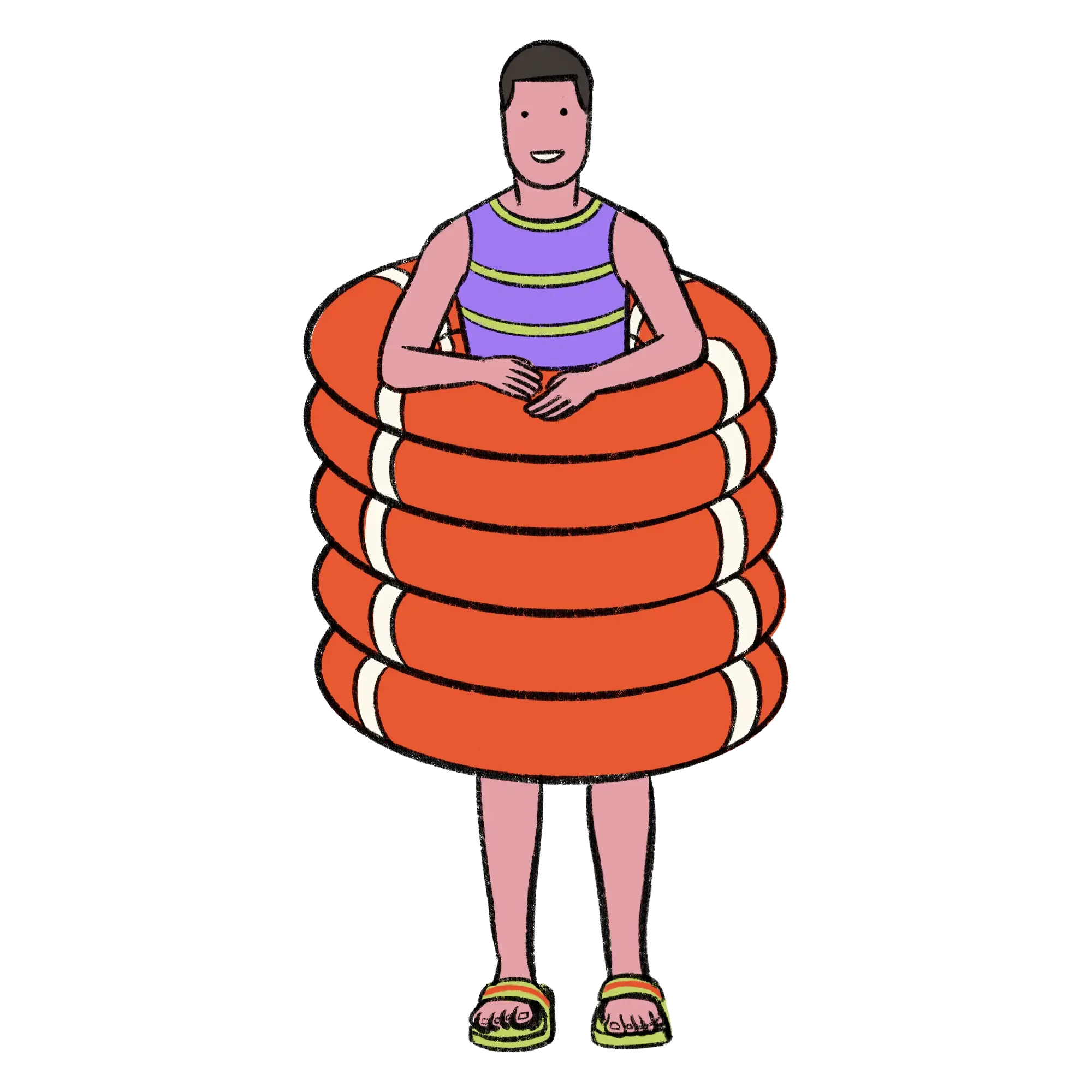If you’re self-employed, you cannot apply for Illness Benefit in Ireland because you don’t fulfil the PRSI requirements to qualify for it.
However, you can still explore alternative benefits to support yourself during long-term illness and time off.
Additionally, if you employ staff, you can help them qualify for Illness Benefit by guiding them through the eligibility process.
We’ll explore why self-employed individuals don’t qualify for Illness Benefit, highlight alternative benefits you can apply for, and discuss how you can help your staff access these benefits.
Further Reading
Can Self-Employed Individuals Claim Illness Benefit in Ireland?
Self-employed people pay their PRSI (Pay Related Social Insurance ) contributions under class S, which automatically makes them ineligible to qualify for Illness Benefit.
According to Irish law, only individuals who pay PRSI contributions under class A, E, H, or P can apply for Illness Benefit payments.
As of January 2025, the Irish government has no plans to make Illness Benefit accessible to self-employed people.
Now you must be wondering…
Why are self-employed people ineligible for Illness Benefit in Ireland?
Illness Benefit in Ireland is funded by the Social Insurance Fund, which relies on Irish citizens' PRSI contributions.
As a self-employed person, you contribute to this fund at a rate of 4%, which is 11.05% lower than the combined maximum employer (11.05%) and employee (4%) contribution of 15.05%.
This difference in contribution rates affects the benefits each group can access.
Essentially, self-employed people don’t qualify for certain benefits due to their lower contribution.
However, depending on your situation, you can still access a significant portion of the fund's benefits by applying for alternatives.
5 Alternatives to Illness Benefit for Self-Employed People in Ireland
As a self-employed individual in Ireland, you can apply for the following social welfare payments (if you qualify for them):
1. Disability Allowance
Disability Allowance is a means-tested weekly payment for Irish citizens aged 16 to 66. They should have a disability that lasts at least one year and restricts them from working.
Disability Allowance payment rates from January 2025:
- Personal rate: €244
- Increase for adult dependant: €162
- Increase for child dependant (under 12): €50 (full rate), €25 (half rate)
- Increase for child dependant (above 12): €62 (full rate), €31 (half rate)
2. Invalidity Pension
The Invalidity Pension is a weekly payment for people who are permanently incapable of working due to a severe illness or disability.
You must fulfil certain medical and social insurance contribution conditions to qualify for the Invalidity Pension. (Check out our Invalidity Pension guide to find out what those are.)
Invalidity Pension payment rates from January 2025:
- Personal rate: €249.50
- Increase for adult dependant: €178.30
- Increase for child dependant (under 12): €50 (full rate), €25 (half rate)
- Increase for child dependant (above 12): €62 (full rate), €31 (half rate)
3. Partial Capacity Benefit
Partial Capacity Benefit is a scheme that allows people on Illness Benefit or Invalidity Pension payments to return to work (in a reduced capacity) while receiving a partial payment.
Eligibility for Partial Capacity Benefit depends on the Department of Social Protection’s assessment of your ‘restriction on capacity for work’. You will qualify for this benefit if your incapacity is assessed as moderate, severe, or profound (no medical certificate needed).
Partial Capacity Benefit payment rates from January 2025:
- Moderate:
- If you received Illness Benefit: €122
- If you received the Invalidity Pension: €124.75
- Severe:
- If you received Illness Benefit: €183
- If you received the Invalidity Pension: €187.15
- Profound:
- If you received Illness Benefit: €244
- If you received the Invalidity Pension: €249.50
4. Long-Term Illness Scheme
The Long-Term Illness Scheme in Ireland is a health support program that provides medications and medical supplies to you for free if you get diagnosed with specific long-term illnesses.
Some of these illnesses include:
- Intellectual disability
- Cerebral palsy
- Epilepsy
- Acute leukaemia, etc.
5. Supplementary Welfare Allowance (SWA)
Supplementary Welfare Allowance is a weekly means-tested payment for Irish citizens who don’t have enough income to meet their or their family's basic needs.
SWA payment rates from January 2025:
- People aged 25 and above and those aged 18 to 24 living independently:
- Personal rate: €242
- Increase for adult dependant: €162
- Increase for child dependant (under 12): €50
- Increase for child dependant (12 and above): €62
- People aged 18 to 24 who aren’t living independently
- Personal rate: €153.70
- Increase for adult dependant: €153.70
While you as a self-employed business owner can rely on these alternatives, your employees could be eligible for Illness Benefit.
Let’s see how you can help them out.
How to Provide Illness Benefit Cover for Your Staff
If you’re a self-employed business owner with employees, you can still play a key role in ensuring your team feels secure during illness.
Here’s what you can do:
- Verify employee PRSI contributions: Ensure that your employees contribute under PRSI Class A, which qualifies them for Illness Benefit. Maintaining accurate payroll processes is essential for compliance and employee well-being.
- Offer private health insurance: Provide your team with private health insurance options to supplement their Illness Benefit and cover long-term medical expenses. This can be a significant employee retention tool.
- Establish transparent communication: Help your employees understand the eligibility requirements and application process for Illness Benefit and other supports available through the Department of Social Protection.
2 FAQs on Illness Benefit for Self-Employed
Here are answers to some common queries about Illness Benefit for self-employed in Ireland:
1. What Was the Enhanced Illness Benefit?
The Enhanced Illness Benefit in Ireland was a temporary benefit introduced by the Irish government to provide income support to people who couldn't work due to COVID-19.
Both employed and self-employed people diagnosed with COVID-19 could apply for it.
The government discontinued this benefit in September 2022.
2. What’s the Difference between Illness Benefit and the Invalidity Pension?
The main difference between the two payments lies in their duration, purpose, and eligibility.
Illness Benefit offers temporary income support to people who cannot work due to a short-term sickness or injury. Its eligibility is also restricted to employees (class A) and those who contribute under classes E, H, and P, excluding Class S PRSI.
Meanwhile, the Invalidity Pension provides long-term income support to those with a permanent incapacity for full-time or part-time work because of a disability.
Anyone who fulfils the qualification criteria can claim Ireland’s Invalidity Pension, regardless of their employment status.
Manage Your Team’s Health Insurance Benefits with Kota
As a self-employed business owner, you may not qualify for the Irish Illness Benefit, leaving you without essential financial support during times of illness.
While the Department of Social Protection (DSP) offers various welfare benefits, they might not fully cover your medical expenses or lost income during recovery.
But what if you could take control of your health coverage—and your team’s—before illness strikes?
That’s where Kota comes in.
Kota is a digital employee benefits platform that helps business owners set up comprehensive health insurance packages from leading providers within minutes.
With just a few clicks, you can:
- Empower Your Team: Let your staff personalize their health coverage options.
- Tailor a Benefits Package: Build a plan suited to your business's needs.
- Save Time and Money: Skip the admin overheads and hidden fees with Kota’s user-friendly, transparent platform.
Join Kota and provide health insurance benefits to your team effortlessly.










.svg)
.svg)
.webp)
.webp)
.png)
.png)
.png)

.png)
.png)
.webp)
.webp)
.webp)
.webp)
.svg)
.svg)
.svg)


